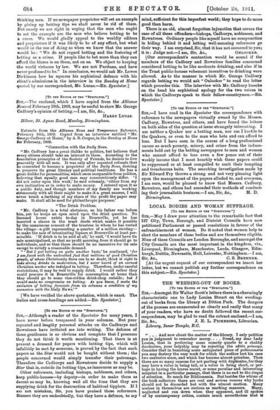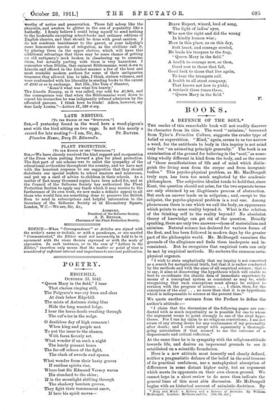THE WEEDING-OUT OF BOOKS.
[To THY EDITOR or THE "SPECTATOR."]
SIR,—Amongst Sir Walter Scott's letters there is a charmingly characteristic one to Lady Louisa Stuart on the weeding- out of books from the library at Ditton Park. The dangers of the process are enumerated so clearly and racily that many of your readers, who have no doubt followed the recent cor- respondence, may be glad to read the extract enclosed.—I am,
" . . And now about the matter of the library. I only petition you in judgment to remember mercy. . . . Dread, my dear Lady Louisa, that in preferring some comedy quarto to a shabby duodecimo, your ladyship may be rejecting the editio princeps. Consider that in banishing some antiquated piece of paissonneris you may destroy the very work for which the author lost his ears two centuries since, and which has become almost priceless. Then there are so many reasons for not parting with duplicates, for they may have a value in being tall, or a value in being short, or per- haps in having the leaves uncut, or some peculiar and interesting misprint in a particular passage, that there is no end to the risque of selection. So much for Bibliomania. But besides the whims of the book collectors there are real and serious reasons why books should not be discarded but with the utmost caution. Many useless in themselves are curious as marking manners. Many, neglected and run down when they appeared, and ill spoken of by contemporary critics, contain much nevertheless that is
worthy of notice and preservation. These fall asleep like the ohrysalis, and awaken to glitter in the sun of popularity like a butterfly. I firmly believe I could bring myself to send nothing to the bookstalls excepting school-books and ordinary editions of English classics, and that should be done with great caution. I do not condemn banishment to the garret, or your ladyship's more honourable species of relegation, as the civilians call it, by placing them on the upper shelves, which will have this additional advantage that there may be some chance of getting an old antiquary's neck broken in clambering up to examine them, but actually parting with them is very hazardous. I remember when Dibdin, that eminent Bibliomaniac, went down to Lincoln and offered in the kindest manner a few of the best and most readable modern authors for some of their antiquarian treasures they allowed him to take, I think, sixteen volumes, and were confounded with his liberality in sending books to the extent of £300 or so in exchange. But Dib , like Tam o' Shanter, Kenn'd what was what fou brawly.' The Lincoln Nosegay, as it was called, was sold for £1,800, and the consequence was that when the Bibliomaniae went down to repeat his researches he was indignantly refused admission by the affronted parsons. I think here be feuds ! Adieu, however, my dear Lady Louisa."—Letters II., 239 et seq.











































 Previous page
Previous page